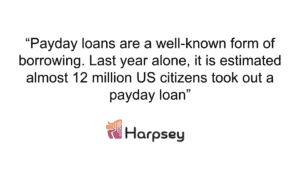Payday loans are a well-known form of borrowing. Last year alone, it is estimated that almost 12 million US citizens took out a payday loan. There are some key differences that are important to consider before you decide to take out a payday loan instead of other loans including the repayment terms, the interest rates and how long you can borrow for.
There are of course other types of loan you could explore. This article will help explain payday loans further and how other forms of financial help are different.
What Are Payday Loans?
A payday loan is a short term and high interest form of lending, which most often is repaid when you receive your next paycheck. If you have been looking for access to quick cash to cover some unexpected payments such as medical bills or housing repairs, you are likely to have come across payday loans as an option during your research.
As the repayment period is so short, it is common for the interest accrued to be far higher than other personal loans. Payday lenders are likely to attract borrowers who have a history of bad credit and are unable to borrow traditional loans from a bank, or are on low income and need access to same day cash.
What Should I Consider Before Taking Out a Payday Loan?
As noted, payday loans can quickly become an expensive form of finance. Furthermore, missing your repayments can lead to late fees, additional interest added to your loan and can seriously damage your credit rating which will affect your ability to take out future loans.
There are a number of considerations you should make before applying for a payday loan. Firstly, you must be confident in your ability to repay your loan and your means to meet your repayments either through your income or your savings.
Explore whether you could borrow from friends or family as this type of borrowing will not gain interest and is likely to have a more flexible repayment process.
Finally, think about how much you really need to borrow. Payday loans should only be used for emergency payments to cover you until your next paycheck. They are not for general spending and or to pay off any other outstanding loans.
How Is A Payday Loan Different To Other Forms Of Loan?
Title Loans
A title loan is a loan in which your car or vehicle is typically used as collateral. A title loan lender will make an offer of between 25% and 50% of the value of your vehicle if it is in good condition.
As you need to have your vehicle appraised in order to receive an offer, you are needed to visit the title loan lender in person. This differs from a payday loan which you are able to apply for online from wherever you are located and have funds deposited into your account the very same day.
Personal Loans
A personal loan is very different from a payday loan. The amount borrowed for a personal loan is typically between £1000 to $50,000 and the repayment terms are often over a longer period of time with a lower interest rate than that of a payday loan.
A reason you might opt for a payday loan is the ability to receive instant funds into your account, as long as you meet the eligibility criteria of having a regular income and being over 18 years of age.
Installment Loans
An installment loan is an alternative you might consider to a payday loan. They can be taken out over a much longer period of time and repayable over up to 60 months. This can help the lender get their finances back on track before the full cost of the loan is repaid.
Borrowers can get an installment loan for house repairs or big purchases such as a car but can also be used for helping your business. Like payday loans, there are options even if you have a bad credit history.
| Credit Status | Months to Repay | Security Needed | Average Rate Charged | Cost per $300 Borrowed | |
| Personal | Good | 24-84 | No | 11.00% | $333 |
| Title | Both | 1 | Yes | 300% | $900 |
| Installment | Both | 60 | No | 11% | $333 |
| Payday | Bad | 1 | No | 400% | 1,200 |
Why Should I Get A Payday Loan?
You should only apply for a payday loan online if you absolutely need it. They are a risky form of finance and you can end up in further financial difficulty if you cannot meet the repayment terms of your loan. They are however a means of covering you until your next paycheck and could be the solution you need to get you back on your feet.


